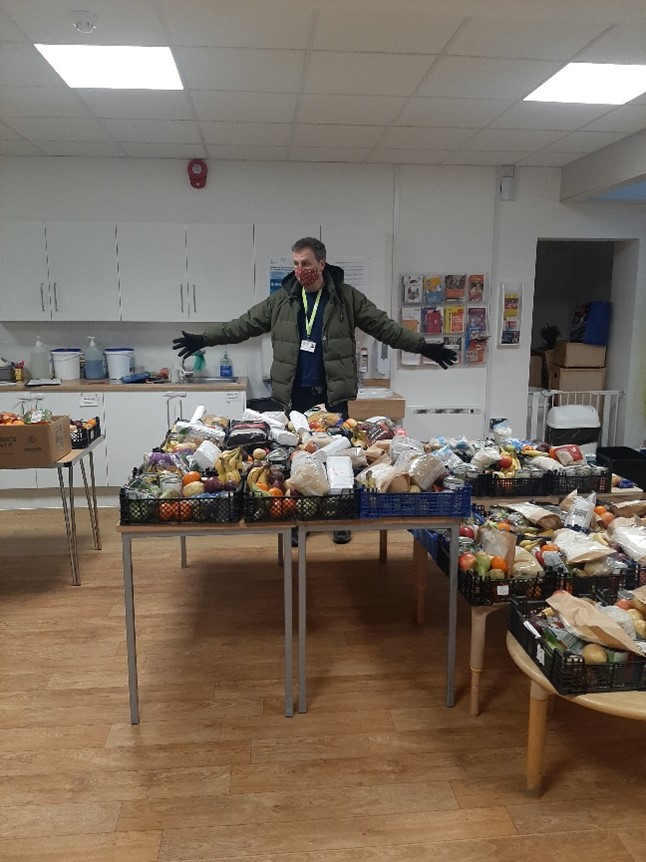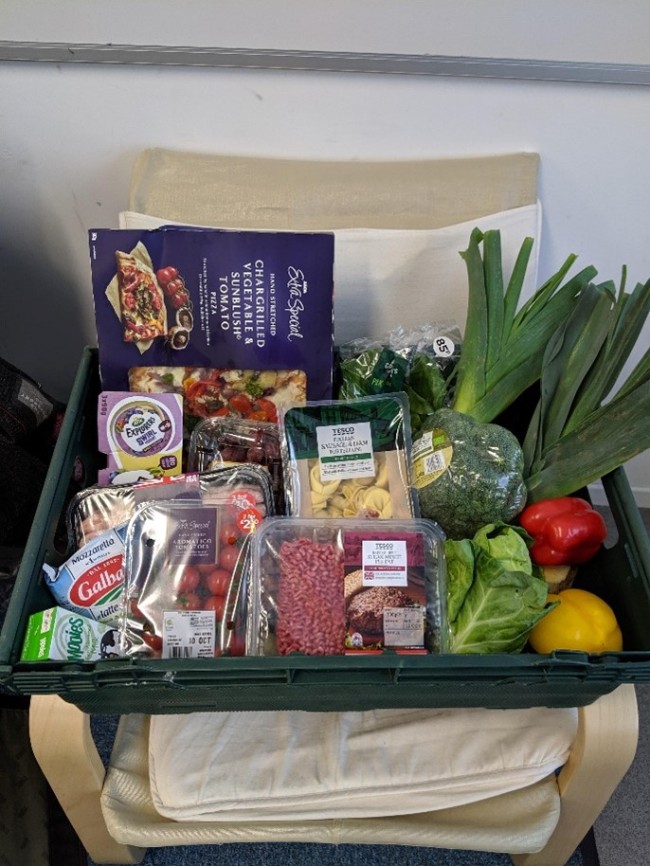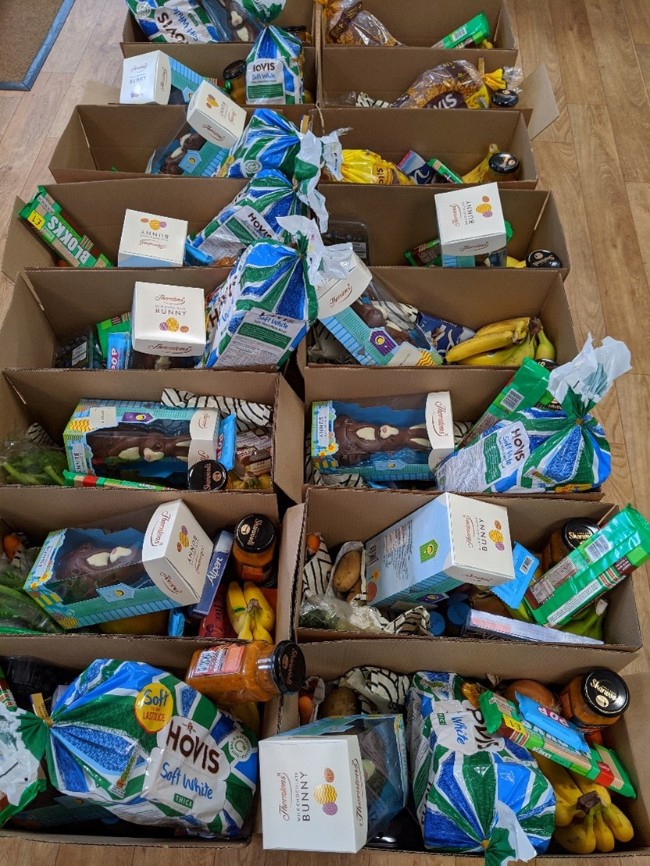COVID-19: Local coordination delivered emergency food, but food plans must address food insecurity
The use of emergency food has increased hugely in the UK in the last 5 years, with the Trussell Trust reporting a 74% increase in food parcels provided between 2015 and early 2020.
Covid-19 brought a surge in demand, with a further 81% increase in food parcels delivered between April-June 2020. This reflects the rapid rise in unemployment and financial insecurity caused by Covid-19 restrictions. The number of households claiming Universal Credit (a driver of foodbank use) doubled between August 2019 and August 2020. Pre-pandemic more than 4 million children in the UK were living in poverty, and Covid-19 has had a serious impact on them with nearly half of low-income families with children finding it very difficult to get by.
Local Authorities and the charities and community organisations they work with are at the forefront of hunger responses across England. It is Local Authorities, charities, education providers, and private businesses that organise and supply the food for breakfast and school holiday schemes, and Free School Meals. Emergency provision for those in financial crisis is also devolved to Local Authorities, supported by the Local Welfare Assistance scheme. Limited funds have meant referrals to local foodbanks have become a key part of this response over the last decade.
During the first national lockdown, food provision for vulnerable groups was organised through these same local groups supported by community groups. In Bristol, this provision was supported by a city-wide response group led by Feeding Bristol and the Public Health team from Bristol City Council. This briefing summarises research undertaken to learn from this model. Between July and November 2020 we interviewed 30 individuals involved in the emergency food response in Bristol. These included a mix of managers and frontline staff from seven FOOD (Food On Our Doorsteps) clubs, four meal providers, six food parcel providers, six education providers, and four infrastructure charities. We asked how local groups had responded, how local coordination had facilitated this response, and what lessons could be taken to inform future food welfare provision.
Key findings
Collaboration and co-ordination
Feeding Bristol estimates the 26 organisations they contacted distributed more than 221,000 meals and 16,200 food parcels in Bristol during May-June 2020. Individual organisation recorded large increases in provision in 2020. For example, the number of FOOD Clubs increased from 3 to 19, the new National Food Service Bristol delivered over 50,000 meals, and the Matthew Tree Project was providing 1,000 extra meals per week by April, up from 8,000 per week in 2019.
The organisations we spoke with were supporting shielded groups, homeless people, those without recourse to public funds, school children, families with pre-school children, black and minority ethnic communities, care leavers, NHS workers, and those living in neighbourhoods without accessible supermarkets.
For many, cross-city coordination was instrumental in bringing organisations and resources together rapidly, supporting a doubling of provision in just a few weeks. New collaborations were felt to be “a legacy for future work” (School)
“at the beginning of lockdown, there were council and all the big actors together and [they] had these weekly meetings…I found them absolutely indispensable” (Meal Service)
“There is a fantastic food and voluntary and public sector network in Bristol. That isn’t just the size of the city, it is also about the openness of the way people work” (Food Club)
However, the very rapidity of the response meant there was a lack of city-wide data on reach and impact. Smaller organisations and newer providers did not have the capacity to devise and capture good monitoring and evaluation data. Reporting required for the Defra Food Charity Grant Fund was burdensome without supporting internal monitoring and evaluation functions.

Image by Simon Green, Family Action
Crisis responses are not sustainable
Individuals and organisations pulled together in a remarkable way to make sure no one in Bristol went hungry during this exceptional time. By the summer, exhaustion was common. Staff and volunteers had worked exceptionally hard, often with long hours and without breaks:
“I don’t think we ever really thought about exhaustion or tiredness. We just thought, you know what? We’ll just keep going, it won’t last forever (School)
“I am really tired emotionally and physically... very, very stressful…constantly trying to figure out new ways to make sure that we could support people and you effectively have people’s kind of lives perched in your hands for a brief moment, and if I say no they might not eat for another four days“ (Meal Service)
“the hours we were all having to work is unbelievable really…[Exhaustion] is an understatement” (Food Parcel)
 Image by Simon Green, Family Action
Image by Simon Green, Family Action
Food insecurity remained a threat
Emergency supplies of donated foods served an essential role in getting food quickly to those in need, but this form of supply can leave people and the organisations that serve them in food insecurity. As one FOOD Club provider told us, in this crisis phase they were providing “ emergency food provision rather than a resilient food provision”.
“Nobody went hungry…don’t get me wrong, we were really grateful for what we were able to provide. But it wasn’t really a well-balanced, nutritional diet” (Food Parcel)
It was not always possible to make sure that people were receiving a healthy, balanced diet, that met peoples’ dietary or cultural food needs or that they wanted to eat. Accurate estimates of service costs for different models were not known, and true person-hours (paid and voluntary) were often unseen. Delivered Food Parcels, in particular, were administratively burdensome (especially for smaller organisations):
“It’s one thing buying food or, you know, giving a donation [of food]...but, if you take off the cost of somebody putting together those food parcels, somebody else to deliver them, then probably that is what the money will buy you” (Food Parcel)
In addition, food parcels were stigmatising and removed choice and agency from recipients:
If they’re feeling quite proud and they’re finding it difficult to come and get a box and then to get something that…is a bit more hand-me-downee” (Food Club)
“Because the feedback I got is parents could plan meals and be actually more economically savvy rather than being bound by what was in a food parcel, which is basically our choice…. that’s where I wouldn’t go back to the way we did food parcels again… I think what [vouchers] did is empowered parents to be part of it” (School)

Image by Simon Green, Family Action
Policy implications
Local coordination works
Local Authorities should build or maintain coordination with key infrastructure charities and community groups to enable a flexible response. This coordination should focus on reduction of food Insecurity as their primary aim.
Local coordination and provision requires localised funding
The additional support available during Covid-19 was welcomed and enabled much of the provision recorded here. But these emergency funds are set against a £1billion shortfall to Public Health funding within Local Authorities. Central Government should provide sustainable funding so Local Authorities can continue to address food insecurity in a more strategic way.
Funders and providers should use a common measure of food insecurity
Local Authorities and food providers need to monitor their impact with common measures, so we know what works and
for whom. The forthcoming national measure of food insecurity should be adopted to enable standardised information collection across the sector.
Food providers should provide accurate estimates of their costs
The true costs of food provision include volunteer hours (including unpaid staff overtime), in-kind resources, and the cost of disposing of unused food. To properly compare different models of food provision the hidden costs of food distribution must be considered.
Funders should consider the long-term viability of projects
One reason accurate cost estimates are needed is the high risk of burn out of staff and resources during periods of high
demand. In most cases, need is not short-term so projects should be viable in the medium- to long-term, or there should be clear plans for hand over where they are planned as emergency responses.
Food parcels should be a last resort
The food charity sector should reduce reliance on donated food as the main form of food welfare for vulnerable groups, and follow innovation in the use of cash, vouchers and subsidies to increase choice and empowerment.
Further information
• Read summaries of interviews from this study.
• Read about the work of Feeding Bristol and the strategic support they offer.
• The Independent Food Aid Network publishes information about independent food banks and research and policy briefings, including a report on the use of vouchers alongside or instead of food parcels in food banks.
• The Trussell Trust supports a network of foodbanks across the UK, and their important campaigning work to create a UK without the need for foodbanks is supported by research and advocacy reports.
• Read about Bristol City Council’s consultation and planning for a hunger free city.
• Liverpool has recently voted to become UKs first ‘Right to Food’ city. Read more about the campaign.
Funding
This work was supported by the Elizabeth Blackwell Institute, University of Bristol and Feeding Bristol and carried out in collaboration with Feeding Bristol and Bristol City Council. Our thanks to all the organisations who took part in this research.
Authors
Patricia J Lucas, Gill Cowburn, University of Bristol; Andy Street, Ped Asgarian, Lucy Jackman, Feeding Bristol; Sally Hogg, Grace Davies, Public Health Team, Bristol City Council
